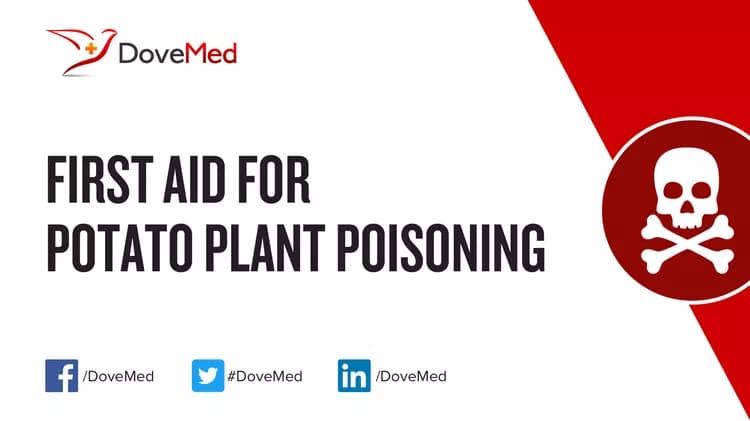What is Potato Plant Poisoning?
- The potato plant (botanical name Solanum tuberosum) is a most sought-after plant that offers a staple food for many nations of the world
- Even though the roots of the potato plant (or potatoes) are typically harmless for human consumption; the new leaves and sprouts and thickened underground green stems (called tubers) are toxic, due to the presence of solanine (a poisonous alkaloid)
- Potato Plant Poisoning is the accidental or intentional intake of the plant parts (such as new sprouting leaves and tubers)
- The condition is diagnosed based upon the clinical history, combination of signs and symptoms, and additional tests (that may include, in some cases, radiological studies and laboratory tests)
Potato Plant Poisoning may be also referred to variously as the following:
- Potato Plant Toxicity
- Solanum Tuberosum Poisoning
What are the Causes of Potato Plant Poisoning?
- Potato Plant Poisoning is caused by eating potato plant parts that contain the toxin solanine in substantial amounts (such as the leaves and green stems)
- This intake could be accidental, or in some cases intentional, to bring self-harm
- All parts of the plant that are green, including green potatoes, are considered toxic
Note: The compound can interact with other prescribed or non-prescribed medications in the body. Such interactions may enhance the therapeutic effects of other medications being taken, resulting in undesired side effects.
What are the Signs and Symptoms of Potato Plant Poisoning?
The signs and symptoms can vary from one individual to another. It may be mild in some and severe in others, and mostly the gastrointestinal system is affected. The signs and symptoms of Potato Plant Poisoning may include:
- Fever and headaches
- Nausea, vomiting
- Abdominal pain
- Diarrhea
- Vision abnormalities including enlarged pupils
- Breathing abnormalities
- Decreased body temperature
- Neurological symptoms include delirium, hallucinations, and loss of sensation
- Shock and paralysis
The time between consumption and onset of signs and symptoms may take several hours (8-10 hours). Ingesting significant quantities of the plant parts can severely affect the central nervous system.
How is First Aid administered for Potato Plant Poisoning?
First Aid tips for Potato Plant Poisoning:
- Call 911 or your local emergency help number immediately, for emergency assistance
- Call the Poison Control Center at 1-800-222-1222 (or your local poison control center) for further instructions
- Provide them with information such as the compound taken, quantity and time of ingestion, age, weight and general health status of affected individual
- Confirm that the airways are protected; also, ensure breathing and the presence of pulse
- Clean the mouth to remove any remaining pieces; wipe mouth with a wet cloth
- Unless instructed by a healthcare professional, DO NOT induce vomiting in the affected individual
- Take individual to emergency room (ER) for further treatment
- Always try to take the plant or plant product to the ER
The emergency medical health professional might perform the following steps towards treating the condition:
- Monitor vital signs
- Medically manage symptoms and provide breathing support, if necessary
- Gastric lavage for elimination of the compound from the stomach (irrigation using special solutions)
- Administer activated charcoal to avoid absorbance of the compound in the body
- Administer laxatives for elimination of the compound from the body
- Administer fluids by an intravenous drip line, if necessary
Who should administer First Aid for Potato Plant Poisoning?
First aid for Potato Plant Poisoning is administered by healthcare professionals.
- The individual who is affected, or someone near, should call 911 for emergency assistance (or the local emergency number)
- They should also call the poison control center at 1-800-222-1222 (or the local poison control center) and follow instructions
What is the Prognosis of Potato Plant Poisoning?
- The prognosis of Potato Plant Poisoning is dependent on the amount of substance consumed, time between consumption and treatment, severity of the symptoms, as well as general health status of the patient
- If the individual can recover from the symptoms that occur due to poisoning, with appropriate and early medication (within 24-72 hours), the outcome is generally good
- In case of severe poisoning, the brain and nervous system may be severely affected. In such cases, the prognosis may be adversely affected. Even though rare, fatalities have been reported from Potato Plant Poisoning
In general, toxicities are common situations in the emergency departments. A majority of the cases are often not fatal, when appropriate treatment is given.
How can Potato Plant Poisoning be Prevented?
Potato Plant Poisoning can be prevented by:
- Avoiding eating green parts of the potato plant, including potatoes with green patches, sprouting potatoes, potatoes that have been stored in the open for long
- Avoiding eating wild berries and plants, especially if you have no information about them
- Following working in the garden or fields, hiking, or camping, always wash hands thoroughly, prior to eating anything
- Being aware of basic first aid steps in case of an emergency (such as inadvertent poisoning)
It is important to give your healthcare provider a complete list of prescription and non-prescription medications that are being currently taken. This will help them in assessing the possible drug interactions within various medications and help avoid/prevent accidental or unintentional toxic drug effects.
What are certain Crucial Steps to be followed?
- Call 911 (or your local emergency number) for emergency assistance, if symptoms are life-threatening
- Call Poison Control Center at 1-800-222-1222 (or the local poison control center) and follow the recommend steps
- It would be helpful if the following information is readily available:
- Type, amount and time of consumption of the substance
- Age and weight of the individual
- And, the overall health status of the individual
Related Articles
Test Your Knowledge
Asked by users
Related Centers
Related Specialties
Related Physicians
Related Procedures
Related Resources
Join DoveHubs
and connect with fellow professionals


0 Comments
Please log in to post a comment.